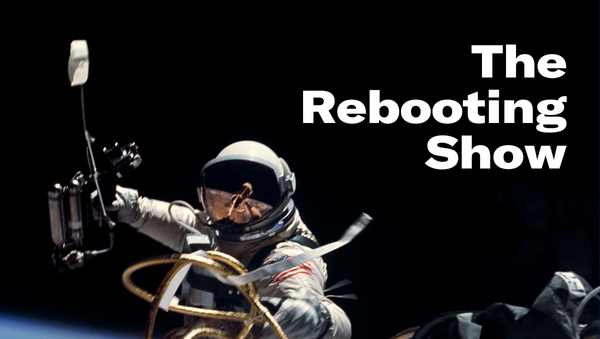The Logic’s David Skok on being a journalist founder
‘The news industry is as much product and business strategy as editorial’
Subscribe on Apple Podcasts and Spotify If you use Apple, please leave a rating and review.
Journalists in their 40s are under no illusions to the need for sustainable business models in news publishing. Being suddenly laid off is a rite of passage.
“Those of us who started in journalism in the late ‘90s, early 2000s, very early on we were awakened to the challenges of the business models,” said David Skok, founder and CEO of The Logic, a four-year-old publisher focused on the growth of the knowledge economy in Canada. “We didn’t have the church and state separation as much as others did in terms of understanding the news industry is as much about product and business strategy as it is your editorial. I’ve always said you could have the best lede or nut graf in the world, but if it didn’t load on your phone in .01 seconds, it was invisible to the reader.”
Founded in 2018 and now with 20 employees, The Logic is an independent publication focused on the knowledge economy in Canada as it transitions away from an economy largely dependent on sectors like mining and real estate. David describes The Logic as “a combination of the business model/product of The Information with the editorial focus of The Financial Times.”
On this episode of The Rebooting Show, David and I discussed why The Logic doesn’t consider itself a tech publication, differentiating through original reporting and why a subscriptions-based business model isn’t subscriptions-only.
Starting from scratch
David is a veteran journalist, with roles at the Boston Globe and The Toronto Star. He started The Logic almost four years ago after recognizing the challenges legacy news organizations face in changing their business models provides an opportunity for new entrants with the right focus.
“I had been a disruptor from within [large news organizations] and seen a lot of the same mistakes being committed and a lot of the same barriers to innovation. I wasn’t seeing a lot of success in large organizations, not because the effort wasn’t there, but because they’re large organizations and they’re slower moving. There was an opportunity, particularly in the Canadian market, which hadn’t had a lot of innovation in a while, to start something new.”
Going beyond tech
Technology long moved from a vertical coverage area to a horizontal. There is a tech angle to just about every news story. For The Logic, that means going beyond technology to zero in on the big story of the Canadian economy shifting its focus to industries like crypto and electric vehicles.
“You can't cover tech anymore without covering the future of everything. Early on, we branded ourselves as a technology publication because it was a way for people to digest what we were doing, but it was almost a Trojan horse. We’re really about the future of the entire economy, not just tech. What we try to do is cover it through a lens of innovation and forward-thinking.”
Differentiation
Being unique and meaningful are the ways to stand out in crowded markets. For The Logic, that means focusing on in-depth, reported stories as opposed to chasing SEO traffic by rushing up an explainer of “What is SWIFT?”
“[The Information’s CEO] Jessica Lessin has talked a lot about this: How do you be 10x better than your competition? You have to make sure you stand out. Do we have unique access to someone or something? Are we telling you something original, breaking original reporting you can’t get anywhere else? All our work is based on original reporting so that we can define the agenda as opposed to follow it.”
Subscriptions+
The Logic began with subscriptions at the heart of its business model. In fact, it wouldn’t run ads for its first two years. Now advertising is 12% of revenue, and David sees the revenue models as complementary. The goal: Arrive at a “Goldilocks moment” in which subscriptions cover operating costs and other sources of revenue, advertising and licensing, provide profits.
“It's almost a flywheel effect. The more subscribers you have – in our case, young and affluent, power brokers, corporate leaders, high household income – all of that's very attractive to an advertiser. We’re able to attract high-level sponsorships — not programmatic advertising but direct sponsorships, — and those then fund more of the newsroom, which allows us to get more subscriptions.”
Advice for those building news brands
“Don’t focus on growth. Focus on surprising and delighting 100 people first, then surprise and delight a thousand people, then surprise and delight 10,000 people. Do something that you simply cannot get anywhere else, then the rest should take care of itself.”
5 things to check out
A sitting U.S. president giving an extended interview to a newsletter writer feels like an important step. Heather Cox Richardson, author of the breakaway hit newsletter Letters from an American, interviewed President Biden for a half hour at the White House. In the span of two days, the video shot from the interview has gotten over 500,000 views on YouTube.
The entire notion of “influencer journalists” is ideal for a weekend in the Twitter fighting pits. Steven Perlberg’s piece on The New York Times grappling with how to square its institutional brand with personal brands ignited a circular firing squad with established journalists taking aim at Taylor Lorenz, who recently left the Times for The Washington Post while making clear she believes the Times doesn’t support the development of personal brands. I’m going to write more about this on Wednesday because, despite the annoying histrionics, I think this is an important issue for modern news organizations.
Over half of publishers surveyed by the UK’s Association of Online Publishers pegged subscriptions as their most promising avenue for revenue growth in the next three years. For consumer publishers, three times more people identified subscriptions than display advertising. That speaks to a near-saturated market becoming oversaturated.
The inevitable result: subscription fatigue. Amanda Mull writes in The Atlantic about a gripe many have at a time of spiraling prices: Just how many times are we expected to fork over a monthly fee? Recurring revenue is such a business model advantage that just about every company is running in this direction. The inevitable shakeout will hurt most those who aren’t providing real value but are instead relying on a cash grab with seductive intro offers and “dark patterns” to keep the uninterested from canceling.
Support Ukraine’s fledgling independent media through this GoFundMe set up by The Fix’s Jakub Parusinski. So far, it has raised over $1 million.

Send me a note with feedback: bmorrissey@gmail.com.
For sponsorship inquires, check out The Rebooting’s sales kit and get in touch to work together.





